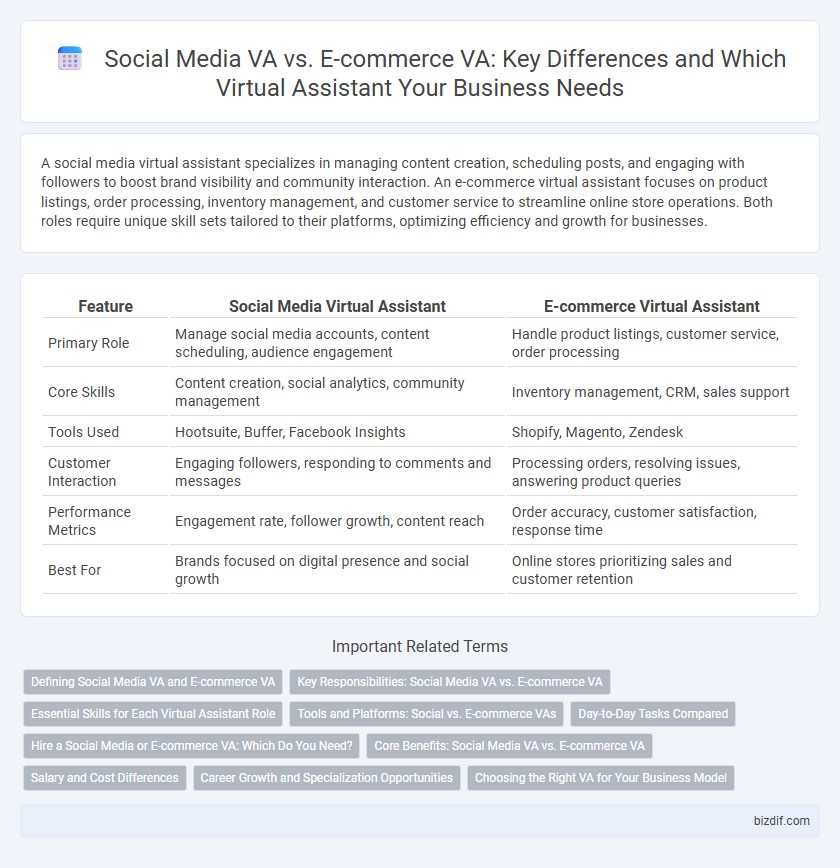A social media virtual assistant specializes in managing content creation, scheduling posts, and engaging with followers to boost brand visibility and community interaction. An e-commerce virtual assistant focuses on product listings, order processing, inventory management, and customer service to streamline online store operations. Both roles require unique skill sets tailored to their platforms, optimizing efficiency and growth for businesses.
Table of Comparison
| Feature | Social Media Virtual Assistant | E-commerce Virtual Assistant |
|---|---|---|
| Primary Role | Manage social media accounts, content scheduling, audience engagement | Handle product listings, customer service, order processing |
| Core Skills | Content creation, social analytics, community management | Inventory management, CRM, sales support |
| Tools Used | Hootsuite, Buffer, Facebook Insights | Shopify, Magento, Zendesk |
| Customer Interaction | Engaging followers, responding to comments and messages | Processing orders, resolving issues, answering product queries |
| Performance Metrics | Engagement rate, follower growth, content reach | Order accuracy, customer satisfaction, response time |
| Best For | Brands focused on digital presence and social growth | Online stores prioritizing sales and customer retention |
Defining Social Media VA and E-commerce VA
Social media virtual assistants specialize in managing platforms like Facebook, Instagram, and Twitter, focusing on content creation, audience engagement, and analytics tracking to enhance brand visibility. E-commerce virtual assistants handle online store operations on platforms such as Shopify, Amazon, and eBay, managing product listings, order processing, and customer support to streamline sales performance. Both roles require tailored expertise to boost online presence and optimize digital business growth effectively.
Key Responsibilities: Social Media VA vs. E-commerce VA
Social Media Virtual Assistants primarily manage content creation, scheduling, and community engagement to boost brand visibility and follower interaction. E-commerce Virtual Assistants focus on product listing optimization, inventory management, and customer order processing to enhance sales efficiency and customer satisfaction. Both roles require proficiency in relevant platforms, but their core responsibilities target different aspects of online business growth.
Essential Skills for Each Virtual Assistant Role
A Social Media Virtual Assistant must excel in content creation, community management, and analytics tools to engage audiences and grow brand presence effectively. An E-commerce Virtual Assistant needs expertise in product listing optimization, inventory management, and customer service to streamline online sales and enhance user experience. Both roles require strong communication skills and proficiency with relevant platforms tailored to their specific functions.
Tools and Platforms: Social vs. E-commerce VAs
Social media virtual assistants specialize in platforms like Facebook, Instagram, and Twitter, utilizing tools such as Hootsuite, Buffer, and Canva for content scheduling, engagement, and graphic design. E-commerce virtual assistants focus on marketplaces like Shopify, Amazon, and eBay, leveraging tools like Oberlo, ShipStation, and Google Analytics to manage product listings, orders, and performance tracking. The choice between social media and e-commerce VAs depends on the primary business goal--brand engagement or online store management.
Day-to-Day Tasks Compared
A Social Media Virtual Assistant manages content creation, community engagement, and platform analytics daily, focusing on audience growth and brand visibility. In contrast, an E-commerce Virtual Assistant handles product listings, inventory updates, and order processing to optimize the online store's functionality and sales performance. Both roles require timely communication and data tracking but cater to distinct digital operations and business goals.
Hire a Social Media or E-commerce VA: Which Do You Need?
Hiring a social media virtual assistant specializes in content creation, audience engagement, and managing multiple platforms to boost brand visibility and customer interaction. An e-commerce virtual assistant focuses on inventory management, order processing, and optimizing product listings to enhance online sales performance. Choose based on your primary business goal: brand growth through social channels or streamlining online store operations for increased revenue.
Core Benefits: Social Media VA vs. E-commerce VA
A Social Media Virtual Assistant excels at enhancing brand presence by managing content creation, scheduling posts, and engaging with followers to boost organic reach and customer loyalty. In contrast, an E-commerce Virtual Assistant specializes in handling product listings, inventory management, order processing, and customer support to streamline sales operations and improve conversion rates. Both roles contribute to business growth, with Social Media VAs driving audience engagement and E-commerce VAs optimizing transactional efficiency.
Salary and Cost Differences
Social media virtual assistants typically earn between $15 to $30 per hour, reflecting their specialized skills in content creation, community management, and platform algorithms. E-commerce virtual assistants often command higher rates, ranging from $20 to $40 per hour, due to expertise in inventory management, order processing, and customer service. Cost differences arise from the complexity and technical demands of e-commerce tasks compared to social media management.
Career Growth and Specialization Opportunities
Social media virtual assistants often experience rapid career growth by mastering content creation, community management, and analytics across diverse platforms, which broadens their specialization opportunities in digital marketing and brand strategy. E-commerce virtual assistants develop expertise in inventory management, product listing optimization, and customer service automation, positioning themselves for advanced roles in supply chain coordination and sales funnel optimization. Specializing in either field enables virtual assistants to leverage industry-specific skills that enhance their professional value and open pathways to higher-paying, niche roles within the growing digital economy.
Choosing the Right VA for Your Business Model
Selecting the ideal virtual assistant depends on your business model's core activities and goals. Social media VAs specialize in content creation, audience engagement, and platform analytics, optimizing brand presence across channels like Instagram, Facebook, and LinkedIn. In contrast, e-commerce VAs focus on inventory management, order processing, customer service, and product listings on platforms such as Shopify, Amazon, or eBay, driving sales efficiency and operational scalability.
Social media VA vs E-commerce VA Infographic

 bizdif.com
bizdif.com